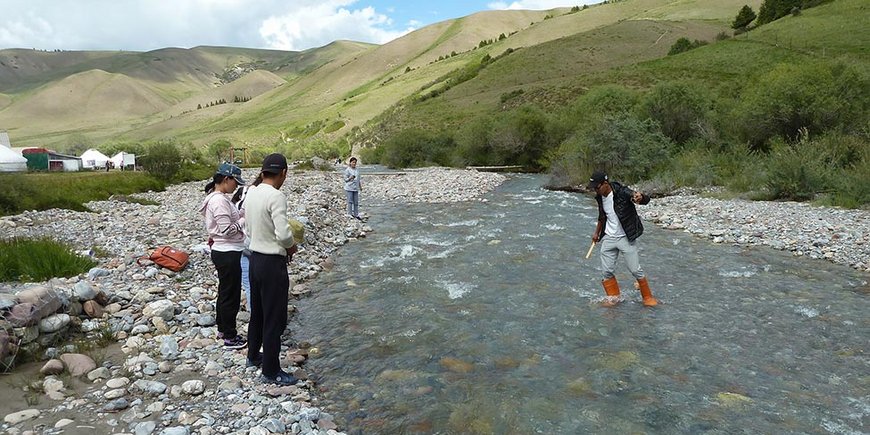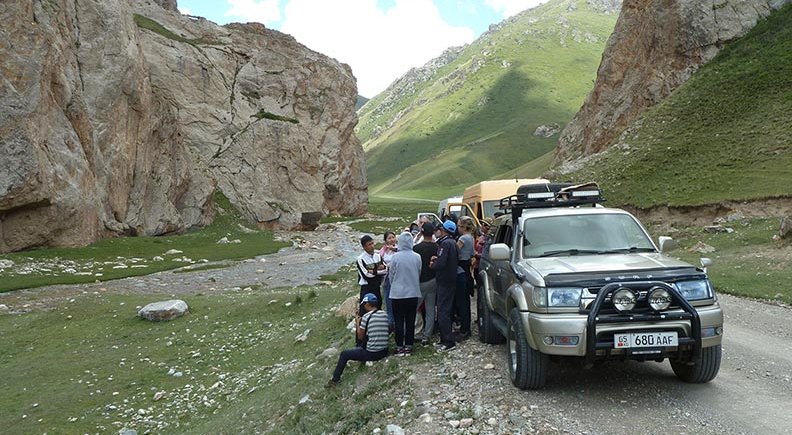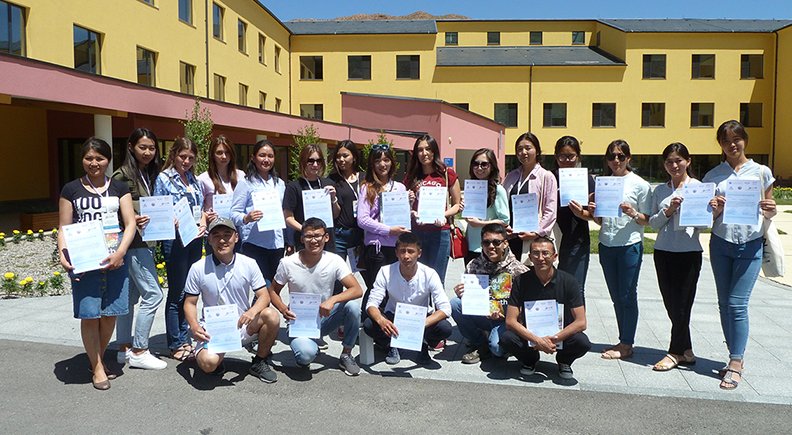Paleo climate science that investigates climates of the past can be of advantage for regional communities as well as the other way around with local activities being of advantage for science. This is the idea behind the project PALESCA ‘Paleoclimate, Environmental Change, and Social Interaction in Central Asia – linking Citizen and Institutional Science‘. In the frame of this project a Summer School was organized for 20 Kyrgyz students by the GFZ and partners, from 2 to 9 July in Naryn, Kyrgyz Republic.
The project PALESCA, funded by the German Federal Ministry of Education and Research, brings together climate research activities with monitoring activities of the local population in mountain regions within Citizen Science projects and at educational centers like schools or national parks. These activities include for example programs that monitor local temperatures or precipitation rates. The project also contributes to networking activities of local stakeholders. ‘Lasting matters are planned as well, like a Soil-Manual for schools on the topics of soil science and conservation.
The Summer School, as part of the PALESCA activities, primarily adds to knowledge transfer from science to society. Jens Mingram, scientist in GFZ section Climate Dynamics and Landscape Evolution and scientific coordinator of PALESCA: „Our aim is to use our knowledge gained in paleo climate science to improve local living conditions, especially in remote mountain regions”. By combining the investigation of paleo climate archives, especially lake sediments and speleothems, with data from monitoring activities in Citizen Science projects, the scientists investigate the causes of climate and non-climate induced extreme events like droughts, flood events, earthquakes or landslides.
The scientists profit by gaining knowledge, the population profits because a better understanding of extreme events implies that they gain more options to protect themselves against them. Mingram: “It would be great if our approach could be transferred to other regions. This is, however, also depending on funding options. The University of Central Asia UCA establishes University campuses in Tadzhikistan and Kazakhstan where similar projects would be conceivable”.
Developing an awareness for changing environments
The Summer School – the first of two, the second one planned for 2019 - educates students from Kyrgyzstan in methods of climate science and involves them in local research activities. 20 participants were selected from several Kirghiz universities via a nationwide application process, by representatives of the organizing institutions. Besides GFZ these organizing institutions were the Mountain Societies Research Institute MSRI in Bishkek as well as the Central Asian Institute of Applied Geoscience CAIAG.
On the campus of the UCA in Naryn, the students took part in several lectures in geoscientific and ecologic topics as well as hands-on-lessons. Experts of the organizing institutions and other international institutions like the Free University of Amsterdam or the Max Planck Institute for Biogeochemistry shared their knowledge with the students.
The scope of topics ranged from biodiversity research to soil science. The participants also took part in field trips, for example to the third largest lake in Kyrgyzstan, the Chatyr-Kul on 3 500 meters. Here, they looked over the shoulders of PALESCA scientists working there and helped with sampling sediment and water off a rubber boat and measuring water quality. They further worked with an active dust collector that allows for interpreting the amount of sediment transported into the lake by wind, and learned about local geology and history of the Chatyr-Kul.
Jens Mingram: „First of all the students developed an awareness that environments change and can become dangerous. May students told us that before they weren’t aware of this at all!” In the future, the scientists hope, the students carry on this approach of 'applied climate science' all over the country.
26.07.2018: Ariane Kujau
The project was funded by the Federal Ministry of Education and Research BMBF










![[Translate to English:] Torsten Sachs in front of a climate station on a field](/fileadmin/_processed_/3/9/csm__TorstenSachs_bearbeitet_GS_4a1365ef84.jpeg)

![[Translate to English:] left image flood at the Ahrtal: image from above, several houses are flooded; left image:: Heidi Kreibich;](/fileadmin/_processed_/4/4/csm_Bild2_9af0130e9f.png)



![[Translate to English:] Start der Vega Rakete](/fileadmin/_processed_/6/4/csm_20231201-kachel_Vega-VV23-launch_ESA-CNES-Arianespace_706716b68c.jpeg)









![[Translate to English:] Poster exhibition at the Brandenburg Hydrogen Day at the GFZ, some participants in the foreground](/fileadmin/_processed_/6/5/csm_Erster_Brandenburgischer_Wasserstofftag_GFZ_402fcec95e.jpeg)
![[Translate to English:] Group picture of the participants](/fileadmin/_processed_/9/4/csm_20231108_CAWa-Workshop-Tashkent_Gruppenbild_99ea779d8a.jpeg)

![[Translate to English:] [Translate to English:] Hörsaal](/fileadmin/_processed_/e/6/csm_H%C3%B6rsal_e21ac645fb.jpeg)


![[Translate to English:] The Delegations in the Historic Library on the Telegrafenberg. In the back there are from left to right, the Dutch Ambassador for Germany, Ronald van Roeden, the Dutch Minister for Education, Culture and Science, Robbert Dijkgraaf and the scientific director of the GFZ, Susanne Buiter.](/fileadmin/_processed_/d/b/csm_Kachel-2_9eba4b4212.jpeg)

